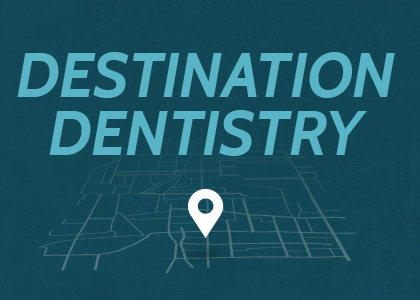Destination Dentistry – Are the Savings Worth the Risk?
Posted on April 13th, 2018

Ah, vacation. The sun, the sand, the… gauze in your mouth? Dental work and recovery might not be your preferred use of your precious vacation days, but some people are packing their bags and heading to exotic locations for dental work in hopes of saving money.
As medical education and technology improve all around the world, destination dentistry or dental tourism is becoming an attractive option for many. Dental tourism is a kind of medical tourism and can reportedly save 70% of costs compared to getting dental work done in the US.
Who Gets Destination Dentistry?
You might have to be a little adventurous to leave your home country for something as vulnerable as dental work, but healthcare costs in the US do prevent many people from getting dental work they might really need or want. Due to cheaper education, licensing, materials, and less bureaucracy in other countries, dentists abroad are able to charge a fraction of those in the US. The most common treatments for patients seeking dental care abroad include dental implants, crowns, and dentures.
Plus, if you’re flying out of the country anyway, you have the opportunity to spend a few extra days somewhere exciting. But dental tourism may not be all it’s cracked up to be and there are some big points you should think about before renewing your passport. Those licensing and bureaucracy standards in the US do serve an important purpose for your safety and well-being.
Top Destinations
The most popular destinations for dental tourism include:
- Mexico
- Thailand
- Spain
- Turkey
- Czech Republic
- Dubai
- Philippines
- Poland
- Costa Rica
- Hungary
Destination Dentistry Pros & Cons
The potential benefits of dental tourism include:
- Your dental work is likely to be a lot cheaper.
- You can visit an exciting or relaxing foreign location.
- You can find quality care in many places outside the US.
- In Europe, dentists have similar education, training, and oversight as dentists in the US, and dental practices are held to the same standards.
However, reasons not to travel for dental work include:
- The practices and conditions might not be to a standard that you’re used to or comfortable with. National standards in the US ensure clean facilities to prevent infection, and drugs and equipment are regulated for safety. This may not be the case for dentists outside the US.
- It will be very hard to get follow-up care from the same dentist who did your work.
- You probably can’t get an exact quote for your total costs until the dentist sees you in person for a consultation.
- Some dental treatments (like dental implants) require two visits, which means more time away from home.
- Costs of airfare, hotels, car rental, and food add up quickly.
Considerations
Weigh all of the pros and cons of traveling far away for dental work, and consider your current lifestyle and wellbeing. If you’re already very busy and tired from the responsibilities of life, you might want a real vacation and not a medical one. Any health complications could also seriously hurt your chances of having successful treatment in a foreign country. Talk to your primary care doctor to get their opinion.
If you’re interested in destination dentistry, talk with your Pleasant Hill dentist first. Even if your dentist isn’t a fan of this idea (he probably won’t be), the decision is ultimately yours, and it’s still important to keep your dentist (who knows your medical history) in the loop. We will probably need to send x-rays and files to the dentist abroad and will want a way to contact the dentist in case of questions about follow-up and recovery.
If you decide dental tourism is right for you, do your research to find the highest quality care possible. The Organization for Safety, Asepsis, and Prevention (OSAP) has a checklist that can help you determine if you are making a safe choice for dentistry abroad. And the World Dental Federation is a good place to check for qualified dentists around the world.
Your oral health is crucial to your overall health and long-term well-being. Only you can decide if the gamble on safety and quality is worth the potential monetary savings. If it’s just a matter of saving money, many dentists offer payment plans and flexible financing options to help you afford the dental care you need. Or, you might qualify for state support to cover costs.
Dr. Chad Johnson at Veranda Dentistry are professional dentists in Pleasant Hill. If you have any dental needs or concerns, before you pack your bags, make an appointment today and let us be your partners in health!
Sources


